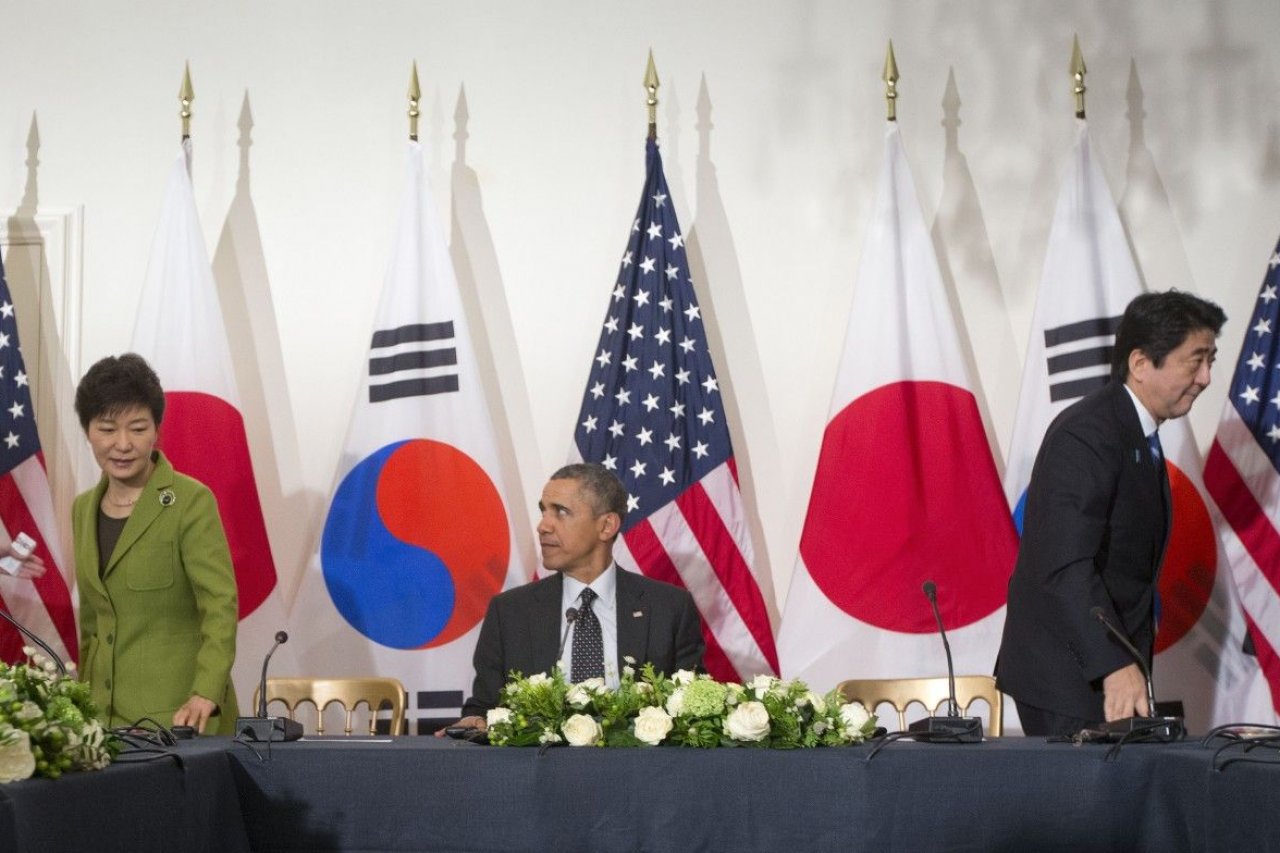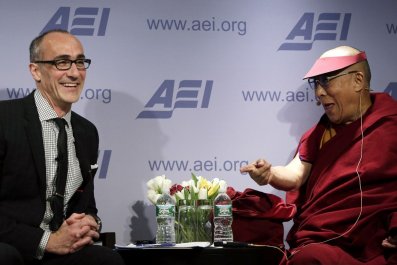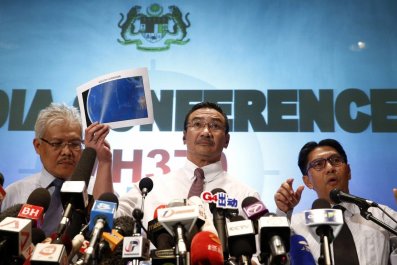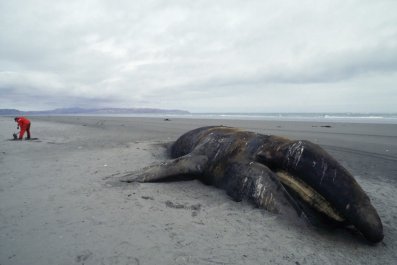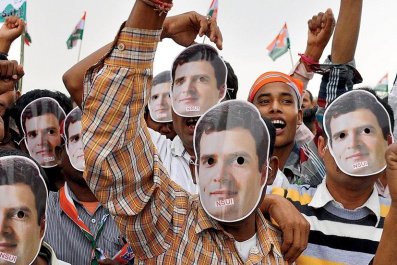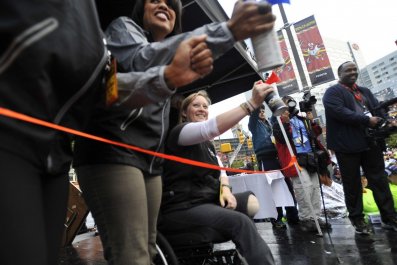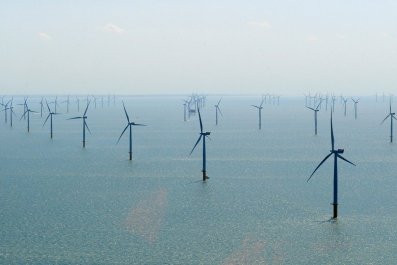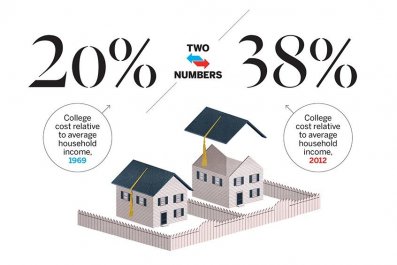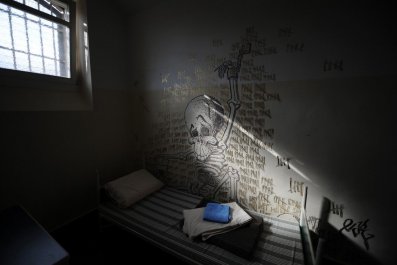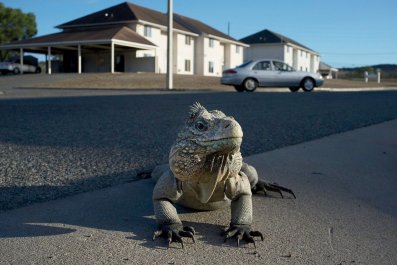South Korea and Japan are vibrant democracies boasting successful free economies. But both countries fear their predatory neighbors are looking to harm them. With that threat in common, American policy makers believe, good-neighborly relations would be beneficial not only for them, but for the region and beyond.
Yet, deep-seated enmities more often mark relations between Seoul and Tokyo than the odd hint at amity. So much so that even after President Barack Obama used all of America's diplomatic might recently to chaperone a meeting between Japanese Prime Minister Shinzo Abe and Korean President Park Geun-hye, relations remained icy.
While Obama hopes to do more during an Asia trip later this month, signs are that past grievances still loom too large to turn these two American allies into 21st century friends. "Japan will hopefully try not to take any further actions that would invite strong responses from South Korea," Seoul's U.N. ambassador, Oh Joon, told me a few days after a meeting between Abe and Park took place in The Hague in late March.
"We are a little bit fed up with dealing with South Korea. We can show remorse and be sincere, but it is never clear what they want from us when they say they want us to face history," said a Tokyo official, who asked for anonymity so he could speak freely. Bad relations between the two countries, he added, are "all about histor—-nothing to do with current affairs."
As if they needed any reminder of the dangers of the threat of war, dozens of artillery rounds were exchanged across the maritime line separating the two Koreas this week. And earlier, even as Park and Abe sat stone-faced in The Hague for a joint public appearance that capped their first meeting since both became leaders, Communist North Korea launched two mid-range missiles. Traveling 400 miles and landing in the ocean to the east of Japan, the missiles missed a Chinese civilian aircraft by a hair, according to a Seoul military official, averting a possible major crisis in this increasingly ill-tempered region.
In closed-door Security Council consultations last month, China's U.N. ambassador Liu Jieyi stopped short of defending the launch—which was a violation of council resolutions—by Beijing's sometime ally, according to a diplomat who participated in the session. Nevertheless, Liu said the annual joint winter military exercise that the U.S. and South Korea launched on February 24, scheduled to last until April 18, was "unhelpful" and "provocative" and likely led to Pyongyang's act of defiance.
Other Pyongyang watchers note that the launch occurred on the anniversary of the sinking of the Cheonan, a South Korean ship that was hit by a torpedo in 2010, killing 46 seamen. Numerous investigations linked the north's military to the event, but Pyongyang has never admitted its responsibility.
But mostly, "it is no coincidence that Pyongyang tested two medium-range missiles on the day of the Abe-Park-Obama meeting," says Mike Chinoy, author of Meltdown: The Inside Story of the North Korean Nuclear Crisis. Chinoy notes that last winter the U.S.-South Korea exercises were marked by endless threats and provocative statements from Pyongyang. By contrast, this year the North Korean leader, Kim Jong-un, kept up a process of North-South family reunions and other diplomatic gestures to South Korea during the exercise.
"The north was clearly sending a signal in response to what it saw as the U.S., Japan, and South Korea ganging up against it—that the [North Korean regime] will not bow to external pressure and remains a force," says Chinoy.
Confronting the repeated missile threats from North Korea as well as countering a growing aggression from China, which increasingly flexes military muscles in the region, make a thaw between Seoul and Tokyo imperative for Washington. President Obama has added a South Korean stop to his late April trip to the region, which also includes Japan.
His task will not be easy. Abe recaptured the Japanese premiership in December 2012 (he was prime minister once before, in 2006 and 2007). Park, who became president two months later, has already refused to meet with her nationalist Japanese counterpart.
Abe's visit to the Yasukuni Shrine late last year did not help matters. Koreans are still smarting from the brutal Japanese occupation of their country from 1910 to 1945. For them the shrine, memorializing the dead of World War II, glorifies some of Japan's most notorious war criminals and is a living reminder of Japan's dark history in the last century.
Making matters worse, Abe's chief cabinet secretary, Yoshihide Suga, indicated in February that Tokyo may rethink its 1993 apology for Japan's abuse of Korean "comfort women," who were abducted and forced into prostitution during the Japanese occupation.
With such history, even some of Obama's toughest American critics acknowledge that getting Abe and Park to sit down, even for a photo op, was a diplomatic coup. "They should have done it a long time ago, but this was good work on the part of the Obama administration," says the American Enterprise Institute's senior fellow Michael Auslin, who often opposes the administration's policies on East Asia.
As Park has long refused to sit down with Abe, Auslin said, the session may have also represented a sort of victory for the Japanese premier. "The chance to engage in an exchange of views with President Obama and Prime Minister Abe is very significant," Park said after the meeting. But press reports in Seoul noted that Park looked pained and unsmiling even as Abe tried to appease her with a few Korean words.
Abe has walked back any speculation that he would rescind Japan's comfort women apology. But some Koreans note that that apology never acknowledged full responsibility for forcing the women to become prostitutes.
In 1998, Japan set up a fund to compensate South Koreans for comfort women-related crimes. After a meeting with then-Japanese prime minister Keizo Obuchi, the South Korean president, Kim Dae-jung, accepted "calls upon both countries to overcome their unfortunate history and to build a future-oriented relationship based on reconciliation as well as good-neighborly and friendly cooperation," according to a joint declaration.
Yet "three subsequent Korean presidents have backed away from that agreement," says James Auer, director of the Center for U.S.-Japan Studies and Cooperation at the Vanderbilt Institute for Public Policy Studies.
In Washington, Obama's declared policy of "rebalancing" America's attentions toward Asia is also being frustrated by deep budget cuts, much of it in the military that is supposed to be a major backbone of the new Asian policy.
Washington is therefore urging Asian countries to increase their defense budgets so they can rely on their own resources for protection. Nothing could help this goal more than better intelligence and military and economic cooperation between Japan and Korea.
The inability of the two countries to overcome their ancient differences, says Chinoy, "is enormously frustrating to the Obama administration as it struggles to deal with North Korea, an increasingly assertive China and other regional issues."



